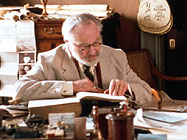|
|
|
|
The
Winslow Boy
|
 |
|
David Mamet long ago joined John Sayles and Woody Allen in the ranks of America's most overrated filmmakers. As a screenwriter, Mamet boasts a verbal signature as unmistakable as Harold Pinter's: arch, circular, deliberately stilted dialogue that drones on relentlessly. As a director, he likes to declare that emotion is born from placing understated images side by side – while, on screen, his artless style produces only plenty of nothing. Happily, The Winslow Boy represents a quantum leap in quality from previous Mamet shockers like Oleanna (1994) and The Spanish Prisoner (1998). It is in many respects an odd project – an essentially faithful adaptation of Terence Rattigan's ultra-British, ultra-classical play of 1946. Although there is an occasional, grating ring of Mamet-ised speech, the frankly quaint, museum-piece quality of the original is meticulously preserved. Indeed, in its frequently funereal formality, this movie evokes nothing so much as the avant-garde theatre-on-film epics of the Portuguese master Manoel De Oliveira (The Convent, 1995). Yet Mamet's fussy, stuffy manner suits the material perfectly – for a change. The Winslow Boy makes a mountain out of a molehill, as do its characters. Everything hinges upon the charge that young Ronnie (Guy Edwards) has forged the signature of a school mate in order to steal a five shilling postal note. Although there is a well-sustained, lingering ambiguity surrounding the inner thoughts and secret deeds of this rather gormless lad, his family – especially his father, Arthur (Nigel Hawthorne), and older, suffragette sister, Catherine (Rebecca Pidgeon) – decide to believe him and secure his defence. It takes a punishingly long time to fight this seemingly hopeless cause, even with the help of a dashing, conservative lawyer, Sir Robert Morton (Jeremy Northam). All throughout the case, the film weaves in traces of the wider, public reception of the affair – via popular songs, cartoons, newspaper headlines – that give the film a sting of mockumentary authenticity. In the meantime, Mamet allows us to patiently examine what the drama is, for him, truly about: the potential absurdity of the family's fight; the class relations which structure every social interaction; and the wellspring of passionate emotion that constantly threatens to overturn the steady-state facade of British repression. It is a strangely moving, surprisingly haunting piece, helped immeasurably by a superb ensemble cast. Mamet manages to capture the frail, human workings of a social system on the very cusp of change, between old and new values pertaining to justice, morality and manners. The writer-director's decision to take leave of his typically hard-boiled, tough-guy, urban milieu results in a welcome renewal of his idiom and his most cherished themes. MORE Mamet: Hoffa, State and Main, Glengarry Glen Ross © Adrian Martin July 1999 |
![]()